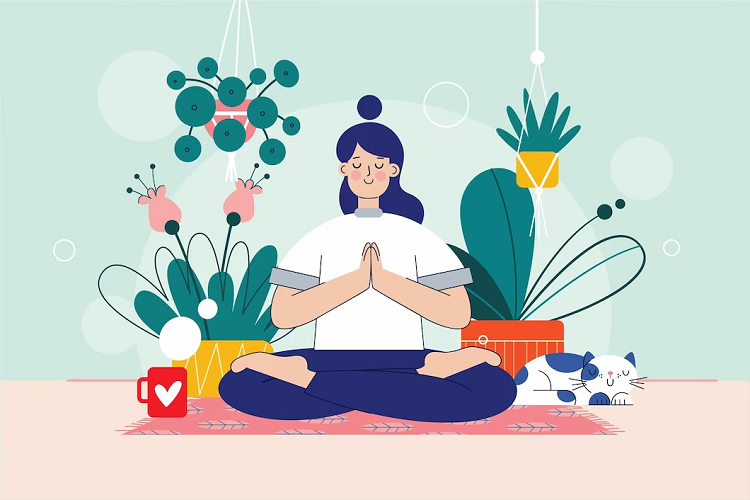Mindfulness is a buzzword that has gained immense popularity over the last decade, and for good reason. In today’s fast-paced world, we are constantly bombarded with distractions and demands on our attention. Our minds are often racing with thoughts about the past or future, and we may find ourselves caught in a never-ending cycle of stress and anxiety. This is where mindfulness comes in. It offers a simple yet powerful way to bring our focus back to the present moment and cultivate a deeper sense of awareness and presence in our daily lives.
At its core, mindfulness is the practice of being present in the moment, observing our thoughts and feelings without judgment. It’s about paying attention to what’s happening in the present moment, without getting caught up in regrets about the past or worries about the future. It’s about fully experiencing the here and now, without letting our minds wander or getting lost in a sea of distractions.
The concept of mindfulness has its roots in ancient Buddhist practices, but it has been adapted and integrated into modern psychology and wellness programs. Numerous scientific studies have shown that mindfulness can have a positive impact on our mental, emotional, and physical well-being. From reducing stress and anxiety to improving cognitive function and increasing empathy and compassion, the benefits of mindfulness are vast and far-reaching.
In our busy lives, it’s easy to get caught up in the hustle and bustle, constantly striving for the next goal or achievement. But mindfulness invites us to slow down, to pause, and to simply be in the present moment. It’s about cultivating a deeper connection with ourselves, with others, and with the world around us.
So, if you’re curious about mindfulness and how it can enhance your daily life, read on. In the following sections, we will explore practical ways to cultivate mindfulness in various aspects of your life, from self-care to relationships, and discover how this simple yet profound practice can bring about positive changes in your overall well-being. Are you ready to embark on this journey of mindfulness with us? Let’s dive in! And don’t forget to share your thoughts and experiences in the comments below.
Understanding Mindfulness
To cultivate mindfulness in our daily lives, it’s important to first understand what it is. Mindfulness is not just about being calm and relaxed. It’s about being fully present and engaged with whatever is happening in the moment, whether it’s pleasant or unpleasant. It can take many forms, from mindful breathing to mindful eating to mindful walking.
One of the key differences between mindfulness and other mental states is that mindfulness is non-judgmental. It’s about observing our thoughts and feelings without labeling them as good or bad. This allows us to develop a more balanced and compassionate relationship with our inner selves.
Key aspects of mindfulness
Developing mindfulness doesn’t require any special equipment or training. It’s something that anyone can do, anytime, anywhere. Here are some tips for cultivating mindfulness in your daily life:
- Start with the breath: One of the simplest ways to cultivate mindfulness is to focus on your breath. Take a few deep breaths, then focus your attention on the sensation of your breath moving in and out of your body. If your mind wanders, gently bring it back to the breath.
- Try a body scan: A body scan is a mindfulness practice that involves bringing your attention to different parts of your body, one at a time. Start at the top of your head and work your way down to your toes, noticing any sensations you feel along the way.
- Use your senses: Mindfulness is all about being present in the moment, so try to engage all of your senses as you go about your day. Notice the colors and textures of the objects around you, the sounds you hear, and the smells and tastes of the foods you eat.
- Practice gratitude: Gratitude is a powerful tool for cultivating mindfulness. Take a few moments each day to reflect on the things you’re grateful for, no matter how small they may seem.
Mindfulness and Self-Care
Cultivating mindfulness into your self-care routine can have profound benefits for your mental and physical health. Here are some ways to practice mindful self-care:
- Mindful breathing: Take a few deep breaths and focus your attention on the sensation of your breath moving in and out of your body. This can be a great way to reduce stress and anxiety.
- Mindful eating: Pay attention to the taste, texture, and smell of your food as you eat. This can help you enjoy your food more fully and be more mindful of when you’re full. Here’s a recipe to get you started on this tip: successrice.com/recipes/spanish-rice/.
- Mindful movement: Activities like yoga, tai chi, and qigong can help you cultivate mindfulness while also improving your physical health.
- Mindful self-compassion: Treat yourself with kindness and compassion, just as you would a good friend. Practice self-compassion by acknowledging your struggles and offering yourself words of encouragement and support.
Mindfulness in Relationships
Mindfulness can also be a powerful tool for improving your relationships with others. Here are some ways to practice mindful communication and conflict resolution:
- Mindful listening: When you’re talking to someone, give them your full attention. Avoid distractions like your phone or the TV, and really listen to what they have to say.
- Mindful conflict resolution: When conflicts arise, try to approach them with a non-judgmental attitude. Listen to the other person’s point of view without interrupting or becoming defensive. Be open to finding a solution that works for both parties.
- Mindful communication: Mindful communication involves speaking with intention and awareness. Take a moment to consider what you want to say before speaking, and try to communicate in a way that is clear, kind, and respectful.
Cultivating mindfulness into your daily life can bring a wide range of benefits, from reduced anxiety and stress to improved relationships and a greater sense of well-being. Whether you’re new to mindfulness or have been practicing for years, there’s always something new to learn and discover. So why not give it a try? Start small, be patient with yourself, and see where your mindfulness practice takes you. And if you have any tips or experiences to share, feel free to leave a comment below!











